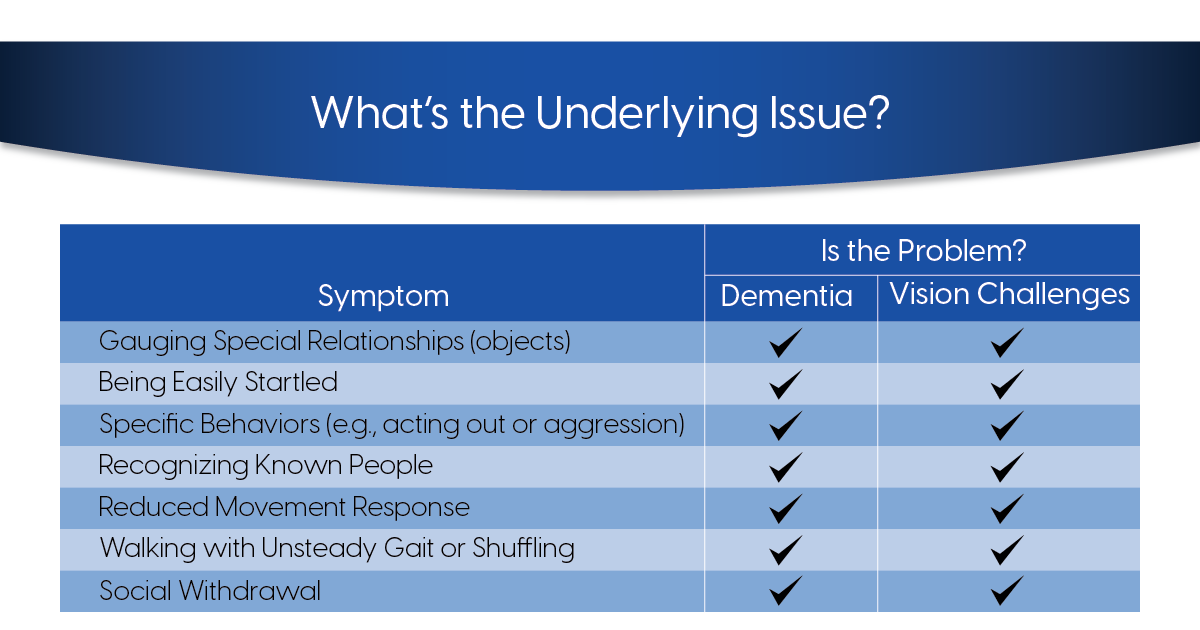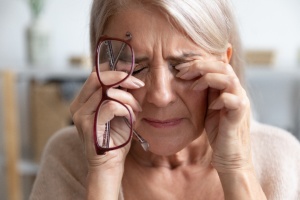Download a PDF version: Recognizing the Intersection of Dementia and Visual Challenges
The brain-vision relationship is close and complex. One syndrome where this connection shows up in older adults is dementia.1 A 2023 study found that all types of objectively measured visual impairment were associated with a higher dementia prevalence among older Americans.2
People with dementia can experience changes in vision that are unrelated to the eye itself. In Lewy body dementia, for instance, small clumps of protein tissue develop within the brain, often in the area that processes visual information. As the disease progresses, the clumps can negatively impact sight and make it hard to recognize objects, with no damage to the eye itself.
Is it dementia or a vision issue?
It can be hard for caregivers to determine whether certain common symptoms and behaviors stem from a cognitive issue or directly from eye problems that need attention. For those with early-to-mid-stage dementia in particular, many cognitive indicators can appear vision-related, and vice versa. The table below cites several common overlapping warning signs:

The importance of careful observation
Problematic behaviors often seen in skilled nursing facilities should be investigated. As a starting point, close observation can provide clues to help decipher which symptoms may be linked to an eye issue. Below are questions for caregivers to consider when they encounter common scenarios:
- Question: Does the resident recognize a cup as something to use when thirsty? When reaching for it, does the individual miss the handle?
Answer: Various vision impairments can impact depth perception, creating a challenge when picking up objects.
- Question: Does the resident have trouble recognizing a loved one or staff member? Does the resident become aware of who the individual is when the person gets closer?
Answer: Loss of central vision due to age-related macular degeneration can impact the ability to immediately recognize a familiar face. Other vision impairments can make facial recognition difficult as well.
- Question: Does the resident startle if someone rushes past to the left or right? Is balance lost when this happens?
Answer: Glaucoma can severely affect peripheral vision, triggering a startle response when movement occurs at the person’s sides. Losing binocular vision negatively affects balance as well.
- Question: When there’s a dark shadow on the floor, does the resident perceive it as a shadow and walk through it? Or is the shadow interpreted as a barrier or obstacle, causing the resident to walk around it or stop altogether?
Answer: Processing shadows caused by light or vision loss itself can become problematic with some eyesight issues.
- Question: Does the resident forget to use a mobility aid or handrail? Or simply miss seeing that one is nearby?
Answer: Myopia from cataracts and/or diabetic retinopathy makes it tough to find assistive devices in the room.
- Question: Is a decrease in appetite contributing to weight loss? Or is the resident struggling to see the food and/or missing their mouth or plate when eating?
Answer: Utensils are harder to pick up when a depth perception issue is present. Some vision impairments affect the ability to differentiate between similar colors, which means seeing food on a dinnerplate can be troublesome.
- Question: Has the resident’s engagement in activities dropped due to difficulty following verbal guidance? Or is the individual unable to see well enough to join in?
Answer: Studies link vision impairment with diminished participation in social activities and personal hobbies.
A smart care strategy for skilled nursing facilities
All told, many older adults have undercorrected vision and other eye issues. Experts assert that untreated vision loss merits greater attention as a modifiable risk factor for dementia. Increasingly, studies suggest that vision impairment may accelerate dementia symptoms and even make onset more likely.3
It’s important that skilled nursing facilities understand the implications of worsening eyesight for both resident and facility. Collaboration with an onsite experienced optometry care provider, such as Aria Care Partners, can ensure active monitoring and routine eye care to help reduce potential risks of cognitive decline while supporting quality of life. Additonally, educating staff about the overlapping symptoms between vision impairment and dementia boosts time efficiency and makes a critical difference in the ability of skilled nursing facilities to deliver high-value, compassionate care.
-
N. Marchesi, F. Fahmideh, F. Boschi, et al., “Ocular Neurodegenerative Diseases: Interconnection between Retina and Cortical Areas,” Cells, September 2021.
-
O. Killeen, Y. Zhou, J. Ehrlich, “Objectively Measured Visual Impairment and Dementia Prevalence in Older Adults in the U.S.,” JAMA Ophthalmology, July 13, 2023.
-
M. Crouch, “Could Correcting Your Vision Lower Your Alzheimer’s Risk?” AARP, September 20, 2022.
 Home Page
Home Page Home Page
Home Page

 Share to Twitter
Share to Twitter
 Share to Linked In
Share to Linked In




